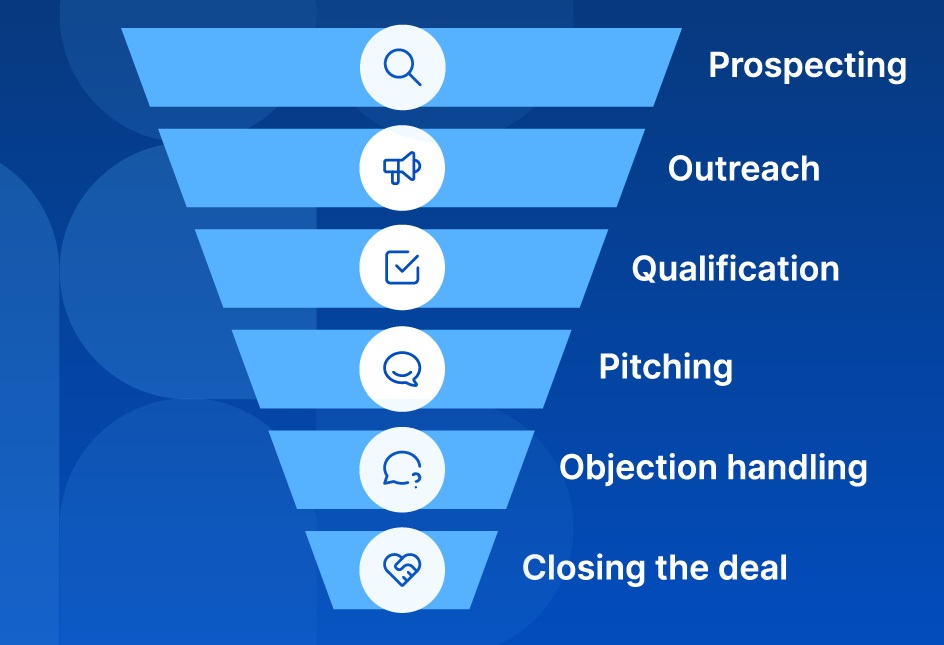
10 Proven Strategies to Accelerate B2B Sales Growth
B2B sales growth is a critical objective for organizations seeking to expand their market share, increase revenue, and build long-term customer relationships. Achieving sustainable growth in the B2B sector requires a combination of strategic planning, process optimization, and effective execution. By implementing proven strategies, businesses can accelerate sales performance, improve conversion rates, and strengthen their competitive advantage. These strategies not only drive immediate results but also create a scalable framework for ongoing success in complex B2B environments.

1. Targeted Account-Based Marketing (ABM): Focusing on high-value accounts rather than broad outreach allows sales teams to prioritize efforts on prospects with the greatest revenue potential. ABM strategies align marketing and sales initiatives, ensuring personalized messaging and tailored engagement that resonates with decision-makers. By concentrating resources on strategic accounts, organizations increase the likelihood of closing deals and building long-term partnerships.
2. Optimize the Sales Process: Streamlining the sales process ensures efficiency and consistency across all stages of the buyer’s journey. Mapping out each step—from lead generation to deal closure—helps identify bottlenecks, eliminate redundancies, and implement best practices. A well-defined process reduces sales cycle times, improves predictability, and enables teams to focus on high-impact activities that drive revenue growth.
3. Leverage Data and Analytics: Utilizing sales data and analytics provides actionable insights into customer behavior, pipeline health, and performance trends. Predictive analytics can forecast opportunities, identify at-risk deals, and guide decision-making. By making data-driven choices, sales teams can prioritize leads effectively, tailor their approach, and achieve higher conversion rates while minimizing wasted effort.
4. Invest in Sales Enablement: Equipping sales teams with the right tools, content, and training improves productivity and effectiveness. Sales enablement ensures that representatives have access to relevant collateral, competitive intelligence, and objection-handling resources at the right time. Continuous training and knowledge sharing empower teams to engage prospects confidently and close deals more efficiently.
5. Enhance Customer Relationships: Building strong, trust-based relationships with clients is essential for long-term success. Regular communication, personalized interactions, and attentive service foster loyalty and repeat business. By understanding customer needs and delivering consistent value, B2B organizations can increase retention rates and generate additional revenue through upselling and cross-selling opportunities.
6. Adopt Technology and Automation: Leveraging CRM systems, AI, and automation tools streamlines repetitive tasks, improves lead management, and enhances follow-up efficiency. Automation enables sales teams to focus on high-value activities such as relationship building and strategic selling. Technology also provides real-time insights into pipeline performance, helping managers make informed decisions and optimize resource allocation.
7. Refine Value Proposition: Clearly articulating a compelling value proposition differentiates your business in a competitive market. B2B buyers are looking for solutions that address specific pain points and deliver measurable outcomes. A well-defined value proposition helps sales teams communicate benefits effectively, resonate with prospects, and demonstrate why your solution is the optimal choice.
8. Implement Consultative Selling: Consultative selling focuses on understanding the unique challenges of each prospect and offering tailored solutions rather than pushing generic products. This approach positions sales representatives as trusted advisors, builds credibility, and enhances the likelihood of closing complex B2B deals. By emphasizing problem-solving and value creation, consultative selling fosters deeper engagement with decision-makers.
9. Measure and Track Key Metrics: Monitoring performance indicators such as conversion rates, deal velocity, pipeline coverage, and customer acquisition cost ensures that sales initiatives remain aligned with business goals. Regularly reviewing metrics allows teams to identify trends, address performance gaps, and optimize strategies for maximum impact. Accountability and measurement are critical components of scalable B2B sales growth.
10. Foster Collaboration Across Teams: Aligning sales, marketing, and customer success teams enhances communication, ensures consistent messaging, and drives collective accountability for revenue growth. Cross-functional collaboration enables sharing of insights, coordination of campaigns, and a unified approach to customer engagement. When teams work cohesively, businesses can deliver seamless experiences, accelerate deal cycles, and maximize revenue potential.
In conclusion, accelerating B2B sales growth requires a multifaceted approach that combines strategic targeting, process optimization, technology adoption, and relationship management. By implementing these ten proven strategies, organizations can improve efficiency, enhance customer engagement, and drive measurable revenue outcomes. B2B companies that embrace data-driven decision-making, leverage innovative tools, and foster cross-functional collaboration position themselves for sustainable growth and long-term market leadership.







-livryt-line-vacter.png)